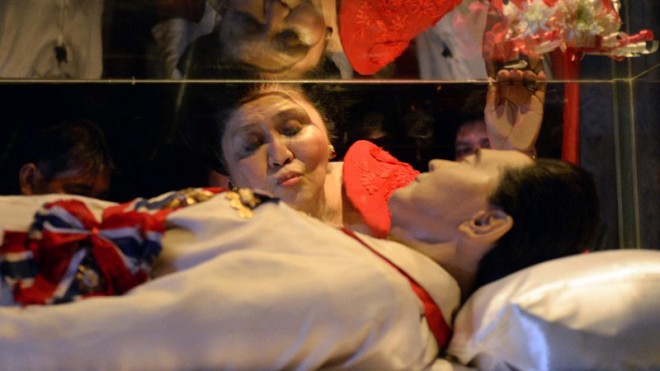
Former Philippine first lady and now congresswoman, Imelda Marcos, kisses the glass case of her late husband president Ferdinand Marcos. AFP FILE PHOTO/TED ALJIBE
ZAMBOANGA CITY — Cesar Climaco Jr., the eldest son of the late Mayor Cesar C. Climaco, described the Supreme Court’s ruling allowing the burial of dictator Ferdinand Marcos at the Libingan ng mga Bayani as a “very bad decision.”
The late mayor was one of the staunchest critics of the Marcoses and the Climaco family believed that his assassination in 1984 had something to do with the Marcoses.
Climaco vowed to find time to visit the Libingan ng Mga Bayani after the burial of the former dictator, “and I am going to pee on his grave.”
“And if they will arrest me for desecrating a grave, I will tell them that there is no desecration on the grave of a criminal,” he said on Wednesday.
But another victim of Martial Law, Dr. Grace Rebollos, a former political detainee and activist, said the country must move on after the Supreme Court decision.
“All we have are memories and lessons. Like it or not, the Supreme Court decision brings us a new way of looking and feeling. Yes, it’s an issue of justice, but the country must move on inspite of bad presidents, past or present,” Rebollos, a retired Western Mindanao State University president and a peace advocate, said in a text message.
Christian Olasimain, a member of the Zamboangueños Against the Hero’s Burial of Marcos, said they have been planning an indignation rally in the coming days.
In Davao City, Mags Maglana, spokesperson of Konsensya Dabaw, reminded President Duterte that the Marcos dictatorship was part of the historical injustices that he has wished to address in the country.
“We should tell President Duterte that we cannot truly discuss historical injustices without recognizing and denouncing the abuses during the time of Marcos,” Maglana said.
Many of those in the inner circle of the Duterte administration and his Cabinet members and advisers were victims of Martial Law.
In this Oct. 18, 2016 file photo, students of the University of the Philippines Cebu stage a protest action against the burial of dictator Ferdinand Marcos at the Libingan ng mga Bayani (CDN FILE PHOTO/ MOREXETTE ERRAM)
Konsensya Dabaw said government must be consistent in appreciating the efforts and sacrifices of Martial Law victims.
Maglana suggested that those opposing the court ruling should distribute copies of the decision for it to be widely discussed and work for the filing of motions for reconsideration.
“We should consult those who have expertise on legality, history and society and explore options by way of motions for reconsideration,” Maglana said. .
Alih Aiyub, secretary general of the National Ulama Conference of the Philippines, said the issue of Marcos has gone “beyond legality.”
“It is the collective grievances of the Filipino people, especially the Moro people who suffered a lot during his dictatorial rule,” Aiyub said.
Thousands either disappeared, were killed, tortured or detained during the Martial Law years, and the victims and their families are still crying for justice, according to Aiyub.
Several Moro communities were subjected to attacks by government forces. These attacks fuelled the anger of the people and led to the uprising of the Moro National Liberation Front.
In the parts of Mindanao, units of the New People’s Army quickly multiplied as the brutalities during Martial Law forced many people to join the communist movement.
“We must not change history to erase the injustices because it is a betrayal of public trust and people’s collective decision,” Aiyub said. SFM